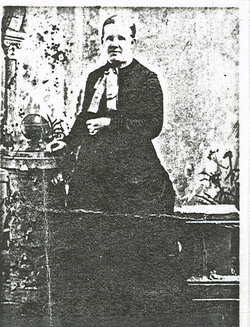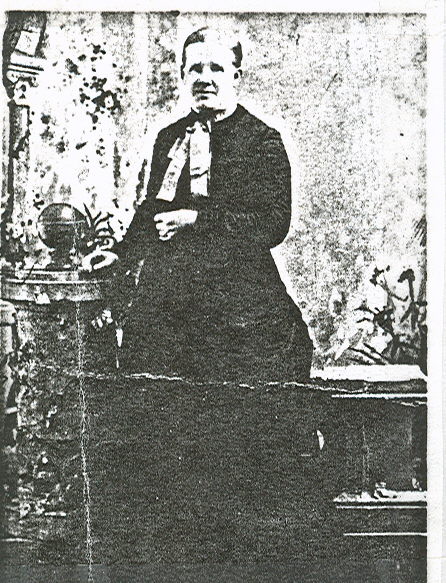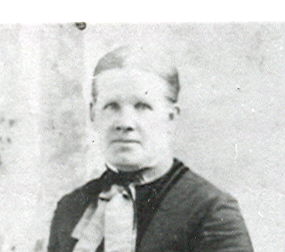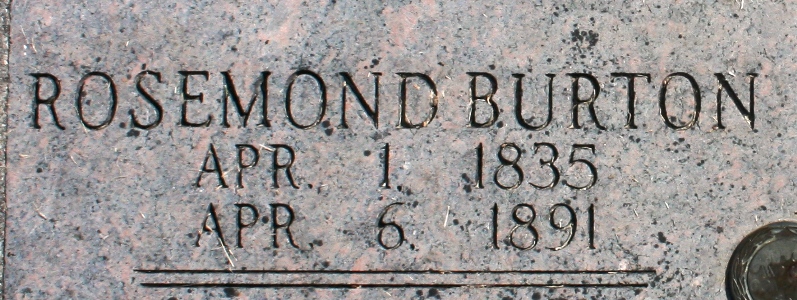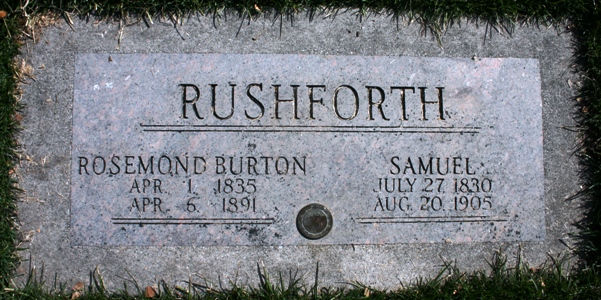Married Samuel Rushforth, 4 Nov 1855
Children - Benjamin Rushforth, James Burton Rushforth, Eliza Burton Rushforth, Elizabeth Rushforth, Samuel Burton Rushforth, Rosemond Burton Rushforth, Isabella Rushforth, Margaret Rushforth, Mary Burton Rushforth, Grace Burton Rushforth, Rachel Burton Rushforth, Martha Burton Rushforth
Arrived in Salt Lake City, Utah: 24 October 1855 - Milo Andrews Company
History:
Rosemond was born April 1, 1838, in York, England. In the year 1848 her father died, leaving her mother a widow with twelve children. Her brother Robert went to American with his uncle, and it was necessary for Rosemond to go out to work to help support the family. She and a younger sister, Margaret, obtained work in a factory weaving cloth.
One morning Rosemond and her sister were hurrying to work. They were late and were afraid they would be locked out of the factory. Maggie had a severe pain in her side and could not walk very fast. Rose ran on ahead and said, " I will hurry and tell them you are sick but that you will be there soon." She met a man as she was hurrying along and said, "Please sir, what time is it?" He told her but followed her. When she ran, he ran, until they came to a gate. As he tried to push her through the gate she seized him by the hair and battered his head with her canteen until he ran away, leaving her to go her way and look at what she had done to her dilapidated dinner and canteen.
While Rosemond was working at the factory the boss who liked Rosemond, came to her and said, "Rose, if I am not here, take care of the door in the morning for me." He was very careful not to let anyone in that was not on time for work. The workers did not like his attitude, so Rose took him at his word and locked him out for he was late that morning. The door was kept locked for a short period of time as punishment for being tardy. At the appointed time she unlocked the door and went about her work as though nothing had happened. Later he came to her and said, "Rose, you did just fine."
Rose joined the Church of Jesus Christ of Latter-Day Saints with her family and was baptized while she was working at the factory. She said nothing to anybody about it. Her fellow workers learned about it and whispered a plan through the crowd to "cry her" as they left the factory. So the workers took their shakers or bonnets off and swung them around and around their heads saying , "Rose Burton has been baptized? Rose Burton is a Latter-Day Saint? Rose Burton is a Mormon?" Rose took her own shaker off and responded by swinging it around and around her own head and saying, "That's my name and I like it! That's my name and I like it!" They were all surprised at her response and they were still her friends.
The family embraced the Gospel in England in the early part of the year 1850. After the Burton family joined the Mormon church their thoughts and hopes turned to coming to American. Her brothers Robert and William came to Utah ahead of the family to help raise funds so the family could emigrate. One morning Rosemond arose and said, "We are going to Utah". Her mother doubted this and said "Nonsense Rose, we can't go. We haven't the money." Rose said, "But we are going mother. I dreamed last night we were going and we are." Her mother thought Rose was foolish, but later in the day the money came from the two brothers in Utah to pay the way for the family that was still in England.
The Burton family left England on April 22, 1855 and crossed the ocean in a sailing vessel named Samuel Curling. There were severe storms while at sea. The Captain stated that in all his experience as a seafaring man he had never seen a worse one, and that the storm would still increase in violence. President Israel Barlow on board told some of the saints that at the time the storm was raging, it seemed the ship would be swallowed in the sea. He then saw angels surrounding the ship, guarding it and he knew that there was no danger because the Lord was watching over it. After a voyage on the water of six weeks, they landed in Philadelphia on May 22, 1855.
At Council Bluffs, they joined with a company of saints with Milo Andrews as Captain and started their trek westward. At night they would make a corral of the wagons to protect themselves from the invasions of savages and wild animals. Then they would turn these grounds into a dance hall for merrymaking in the evening. They could also turn it into a church and pray for the Lord to protect them from harm. The pioneers' provisions were handled with meagerness in order that they would last until the journey was finished.
Rosemond walked across the plains, helping to drive the cattle. Her mother, a woman of 53 years, also walked and shared the many responsibilities of the journey until she fell from the wagon, The wagon wheel passed over her leg breaking it. So she had to ride the remaining distance which was a trial for her as the captain was rather cross. She had an ambitious spirit though and raised her family without a kind father's help to rely on for he had passed away before the Gospel come to them in England. But her recovery was speedy for she had lots of faith. They had nothing to bathe or poultice the wound with but fresh manure from the oxen, which they used in the form of a poultice to keep out inflammation. This poultice was very successful. Food was very scarce. Their flour was weighed out to them, and many times they had very little to eat.
The company arrived in Salt Lake City in the autumn of 1855, where they were met by a brother, Robert W. Burton, who came with an earlier company. He took them to his home in Kaysville, located on what is now the James R. Webb property.
The winter of 1855 was known to these people as the "hard winter". They had very little food. For six weeks they did not taste bread. What little flour they had was used for thickening their soup, which was made from an old cow that was so weak from lack of food, it could not stand. Feed was as hard to get for animals as it was for man. In the spring of that year their food consisted mainly of greens, being made from nettles, pig weeds, and other kinds of weeds.
Rose lived at the home of her brother Robert until she was married to a sweetheart that came with the Burton family to America, thus changing her name to Mrs. Samuel Rushforth. Samuel Rushforth and Rosemond Burton were married 4 November 1855, soon after their arrival in the land of Zion. They later received their endowments in the Salt Lake Endowment House on the 5th of July 1862. The only things they had for a start was a testimony of the Gospel and a spinning wheel. The latter, Rosemond used to spin and spool the wool ready to be woven into cloth by others who had the machines on which to weave it. They passed through all the hardships of pioneer life; weaving, spinning, carding wool, knitting, making soap and candles, drying berries and gleaning in the grain fields. Living on bran bread, greens and soup, making shoes out of old felt, cutting out pants for her husband with no other than a butcher knife.
When the crops came up, things looked more promising. One day Rosemond had been out hoeing in the garden. It looked so nice. She came back to the house, and sat down on the doorstep to rest. As she sat there, the sun went dark as though under a cloud. She heard a swishing noise, and in five minutes a devasting throng of grasshoppers had made the garden a thing of the past. Imagine her disappointment. The seed was gone, and the children's' food to which they were looking forward with such anticipation was gone because of the grasshoppers.
Samuel Rushforth was ever ready to entertain with his cherished violin. He led the choir in Kaysville for a time with the help of Brother Bodily and his big bass violin. Samuel helped to make adobes for a number of buildings, one being the old amusement hall now standing in the First Ward of Kaysville.
Rosemond and Samuel Rushforth were the parents of twelve children, several of them proceeded them to the great beyond. Four died as children. In Samuel's journal he recorded the birth of each child with the date and time of day. Elizabeth was dragged to death by a cow at the age of 23. She had put the rope on the cow then tied the other end around her waist. The cow spooked and ran, pulling her behind. Isabella died at the age of 6 years. Margaret died at the age of 12 years, and Rachel died in infancy. The remaining seven grew to maturity ever revering and honoring their name and cherishing the heritage their parents gave them.
James the oldest living son did much to help in supporting this large family in the days of hardship and struggle. He hauled logs from the canyon to build a house and sheds and outbuildings. He tried hard to help in every way he could. He had a family of small children when he was taken by death at the age of 48 leaving them to make for themselves with the help of their mother.
It was a busy life for Rose and Samuel Rushforth, with their large family and the many cares and hardships that circumstances placed upon them. They were kind to others, and were always ready to give a helping hand to those in need. Rose helped others many times in sickness and death…going to their homes to cheer and comfort them.
Rosemond died at her home in Kaysville, April 6, 1891, at the age of 58 - just when life meant so much to her and the rest of us - leaving Samuel alone. Rose was buried in the Kaysville-Layton Cemetery. Samuel Rushforth lived 15 years after her death and died on the old farm that he
homesteaded in early manhood. He died August 20, 1905 at the age of 75.
Married Samuel Rushforth, 4 Nov 1855
Children - Benjamin Rushforth, James Burton Rushforth, Eliza Burton Rushforth, Elizabeth Rushforth, Samuel Burton Rushforth, Rosemond Burton Rushforth, Isabella Rushforth, Margaret Rushforth, Mary Burton Rushforth, Grace Burton Rushforth, Rachel Burton Rushforth, Martha Burton Rushforth
Arrived in Salt Lake City, Utah: 24 October 1855 - Milo Andrews Company
History:
Rosemond was born April 1, 1838, in York, England. In the year 1848 her father died, leaving her mother a widow with twelve children. Her brother Robert went to American with his uncle, and it was necessary for Rosemond to go out to work to help support the family. She and a younger sister, Margaret, obtained work in a factory weaving cloth.
One morning Rosemond and her sister were hurrying to work. They were late and were afraid they would be locked out of the factory. Maggie had a severe pain in her side and could not walk very fast. Rose ran on ahead and said, " I will hurry and tell them you are sick but that you will be there soon." She met a man as she was hurrying along and said, "Please sir, what time is it?" He told her but followed her. When she ran, he ran, until they came to a gate. As he tried to push her through the gate she seized him by the hair and battered his head with her canteen until he ran away, leaving her to go her way and look at what she had done to her dilapidated dinner and canteen.
While Rosemond was working at the factory the boss who liked Rosemond, came to her and said, "Rose, if I am not here, take care of the door in the morning for me." He was very careful not to let anyone in that was not on time for work. The workers did not like his attitude, so Rose took him at his word and locked him out for he was late that morning. The door was kept locked for a short period of time as punishment for being tardy. At the appointed time she unlocked the door and went about her work as though nothing had happened. Later he came to her and said, "Rose, you did just fine."
Rose joined the Church of Jesus Christ of Latter-Day Saints with her family and was baptized while she was working at the factory. She said nothing to anybody about it. Her fellow workers learned about it and whispered a plan through the crowd to "cry her" as they left the factory. So the workers took their shakers or bonnets off and swung them around and around their heads saying , "Rose Burton has been baptized? Rose Burton is a Latter-Day Saint? Rose Burton is a Mormon?" Rose took her own shaker off and responded by swinging it around and around her own head and saying, "That's my name and I like it! That's my name and I like it!" They were all surprised at her response and they were still her friends.
The family embraced the Gospel in England in the early part of the year 1850. After the Burton family joined the Mormon church their thoughts and hopes turned to coming to American. Her brothers Robert and William came to Utah ahead of the family to help raise funds so the family could emigrate. One morning Rosemond arose and said, "We are going to Utah". Her mother doubted this and said "Nonsense Rose, we can't go. We haven't the money." Rose said, "But we are going mother. I dreamed last night we were going and we are." Her mother thought Rose was foolish, but later in the day the money came from the two brothers in Utah to pay the way for the family that was still in England.
The Burton family left England on April 22, 1855 and crossed the ocean in a sailing vessel named Samuel Curling. There were severe storms while at sea. The Captain stated that in all his experience as a seafaring man he had never seen a worse one, and that the storm would still increase in violence. President Israel Barlow on board told some of the saints that at the time the storm was raging, it seemed the ship would be swallowed in the sea. He then saw angels surrounding the ship, guarding it and he knew that there was no danger because the Lord was watching over it. After a voyage on the water of six weeks, they landed in Philadelphia on May 22, 1855.
At Council Bluffs, they joined with a company of saints with Milo Andrews as Captain and started their trek westward. At night they would make a corral of the wagons to protect themselves from the invasions of savages and wild animals. Then they would turn these grounds into a dance hall for merrymaking in the evening. They could also turn it into a church and pray for the Lord to protect them from harm. The pioneers' provisions were handled with meagerness in order that they would last until the journey was finished.
Rosemond walked across the plains, helping to drive the cattle. Her mother, a woman of 53 years, also walked and shared the many responsibilities of the journey until she fell from the wagon, The wagon wheel passed over her leg breaking it. So she had to ride the remaining distance which was a trial for her as the captain was rather cross. She had an ambitious spirit though and raised her family without a kind father's help to rely on for he had passed away before the Gospel come to them in England. But her recovery was speedy for she had lots of faith. They had nothing to bathe or poultice the wound with but fresh manure from the oxen, which they used in the form of a poultice to keep out inflammation. This poultice was very successful. Food was very scarce. Their flour was weighed out to them, and many times they had very little to eat.
The company arrived in Salt Lake City in the autumn of 1855, where they were met by a brother, Robert W. Burton, who came with an earlier company. He took them to his home in Kaysville, located on what is now the James R. Webb property.
The winter of 1855 was known to these people as the "hard winter". They had very little food. For six weeks they did not taste bread. What little flour they had was used for thickening their soup, which was made from an old cow that was so weak from lack of food, it could not stand. Feed was as hard to get for animals as it was for man. In the spring of that year their food consisted mainly of greens, being made from nettles, pig weeds, and other kinds of weeds.
Rose lived at the home of her brother Robert until she was married to a sweetheart that came with the Burton family to America, thus changing her name to Mrs. Samuel Rushforth. Samuel Rushforth and Rosemond Burton were married 4 November 1855, soon after their arrival in the land of Zion. They later received their endowments in the Salt Lake Endowment House on the 5th of July 1862. The only things they had for a start was a testimony of the Gospel and a spinning wheel. The latter, Rosemond used to spin and spool the wool ready to be woven into cloth by others who had the machines on which to weave it. They passed through all the hardships of pioneer life; weaving, spinning, carding wool, knitting, making soap and candles, drying berries and gleaning in the grain fields. Living on bran bread, greens and soup, making shoes out of old felt, cutting out pants for her husband with no other than a butcher knife.
When the crops came up, things looked more promising. One day Rosemond had been out hoeing in the garden. It looked so nice. She came back to the house, and sat down on the doorstep to rest. As she sat there, the sun went dark as though under a cloud. She heard a swishing noise, and in five minutes a devasting throng of grasshoppers had made the garden a thing of the past. Imagine her disappointment. The seed was gone, and the children's' food to which they were looking forward with such anticipation was gone because of the grasshoppers.
Samuel Rushforth was ever ready to entertain with his cherished violin. He led the choir in Kaysville for a time with the help of Brother Bodily and his big bass violin. Samuel helped to make adobes for a number of buildings, one being the old amusement hall now standing in the First Ward of Kaysville.
Rosemond and Samuel Rushforth were the parents of twelve children, several of them proceeded them to the great beyond. Four died as children. In Samuel's journal he recorded the birth of each child with the date and time of day. Elizabeth was dragged to death by a cow at the age of 23. She had put the rope on the cow then tied the other end around her waist. The cow spooked and ran, pulling her behind. Isabella died at the age of 6 years. Margaret died at the age of 12 years, and Rachel died in infancy. The remaining seven grew to maturity ever revering and honoring their name and cherishing the heritage their parents gave them.
James the oldest living son did much to help in supporting this large family in the days of hardship and struggle. He hauled logs from the canyon to build a house and sheds and outbuildings. He tried hard to help in every way he could. He had a family of small children when he was taken by death at the age of 48 leaving them to make for themselves with the help of their mother.
It was a busy life for Rose and Samuel Rushforth, with their large family and the many cares and hardships that circumstances placed upon them. They were kind to others, and were always ready to give a helping hand to those in need. Rose helped others many times in sickness and death…going to their homes to cheer and comfort them.
Rosemond died at her home in Kaysville, April 6, 1891, at the age of 58 - just when life meant so much to her and the rest of us - leaving Samuel alone. Rose was buried in the Kaysville-Layton Cemetery. Samuel Rushforth lived 15 years after her death and died on the old farm that he
homesteaded in early manhood. He died August 20, 1905 at the age of 75.
Family Members
-
![]()
James Burton Rushforth
1858–1906
-
![]()
Eliza Burton Rushforth Jardine
1859–1943
-
![]()
Elizabeth Rushforth
1861–1884
-
![]()
Samuel Burton Rushforth
1863–1945
-
![]()
Rosemond Burton Rushforth Peart
1865–1918
-
Isabella Rushforth
1866–1872
-
Margaret Rushforth
1869–1880
-
![]()
Mary Burton Rushforth Peart
1871–1967
-
Rachel Burton Rushforth
1873–1873
-
![]()
Grace Burton Rushforth Meldrum
1873–1957
-
![]()
Martha Burton Rushforth Butcher
1877–1943
Advertisement
Advertisement
